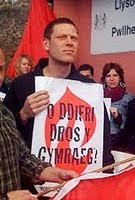
…de la
Caernarfon Denbigh Herald:
That Osian Jones* has been sent to prison saddened me greatly. He was sentenced to 28 days for refusing to pay fines and costs totalling £1,120, imposed after he had painted pro-Welsh slogans on two English-based chain-stores in Bangor.
It appears that this was the longest sentence imposed on a Cymdeithas yr Iaith member since 1991, eighteen years ago. The first (of some hundreds, since) was Geraint Jones of Trefor, also sent down for a month as far back as 1966.
The law treated Osian Jones just as if he had been caught shoplifting, or some other offence involving dishonesty or violence.
Having been a lawyer for the whole of my adult life, I naturally have a great respect for the law and the courts. But I am equally aware of the law’s many failings.
Anyone who has the slightest knowledge of history will be aware that many worthy movements have only succeeded in their aims by campaigns of law-breaking, aimed at recalcitrant legislators who stubbornly refuse to right injustices. The protest movements won in the end, but only after much needless sacrifice and suffering.
Examples are legion: take the trade-union movement and the enfranchisement of black people in the United States and South Africa, where the names of Martin Luther King and Nelson Mandela are shining examples of those who suffered for elementary human rights. And, nearer home, the Suffragettes, many thousands of whom went to prison to secure votes for women.
One hundred years ago, the law would have been handing out a sentence of 28 days to some wretched female, who had transgressed merely because she felt women were entitled to the right to vote. That too, was lawful in its day. But it proves that our law does not cater for unjust and imperfect situations.
The remedy for this country is a new Welsh Language Act: Wales badly needs it - now!
.
* CYFEIRIAD/ADRESO:
..Osian Jones
..Rhif / No. DX8265,..
..HM Prison Altcourse,
..Fazakerley,
..Lerpwl, L97 LH
..Lloegr (UK)



















































